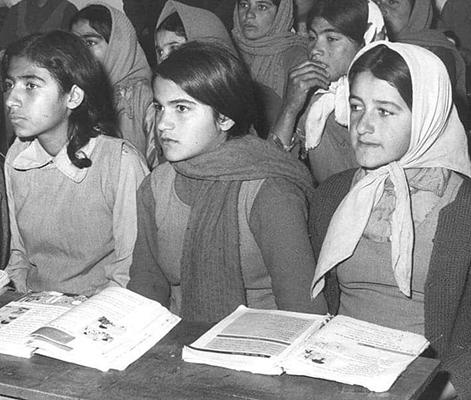It is lunchtime; We are hungry very much!
Translated by M. B. Khoshnevisan
2024-12-19
The routine of our [Fatemeh Keshavarzian] rallies was that the boys would walk from their high school, located behind our school (school name: Mahboobeh Mottaheddin), to the girls’ school to go together to where they were supposed to rally. The brothers, as they had done in the previous days, approached our school and opened the door. I and a few female students who had been waiting for the revolutionary brothers to arrive, joined them. The school principal began to threaten and said, “Mrs. Keshavarzian! Rest assured, if you step out of school, your discipline grade will be zero.” Ignoring the principal’s words, we started to move along with the brothers while chanting slogans.

The next day, when we planned to demonstrate, the principal put up stubborn resistance. This resistance was natural, because SAVAK would definitely find out and this incident would have serious consequences for the principal. We waited until noon to get her consent to go to the rally, but she had put her foot down and wouldn't let us. The principal's resistance had increased since the day before. The principal's resistance had increased since the day before. It was already noon and the guys, hungry and desperate to march, were leaving school, until a brilliant idea came to me. We had to spice up our work in some way so that the guys wouldn't get tired; so I told them: "Let's go to the principal's office and recite the poem I'm going to read to you." The guys said: "Now tell us your poem, let's see how it goes." I recited the poem to them: "It's lunchtime / We're hungry very much." They kept repeating it until we reached the principal's office. When we arrived, I told the guys: "Come on, everyone, recite the poem you learned out loud; just don't forget to tap your feet in unison while reciting the poem and, as it were, get into rhythm!"
The guys performed the play according to the plan I had drawn up for them. There was a commotion in the school hall. The principal came out of her office in confusion. When she saw the situation, she started threatening again: "Be sure, if you step out of school, I will hand over all of you to the security organization." At that time, the name SAVAK was still scary, but despite all this, we were determined to go to the rally and continued our work, ignoring the principal's words, until the principal was forced to let the students go in order to keep the school atmosphere calm.
As we were leaving the school happy and smiling, the principal raised her voice and said, "Keshavarzian, rest assured! You are the first person whose name I will give to SAVAK!"
Source: The Fifth Festival of Sacred Defense Memory-Writing with the topic of memoirs of the veteran women of Mazandaran Province during the Islamic revolution and sacred defense, Sari, Srav-e Sorkh-e Bonyad, 1396 (2017), pp.33-34.
Number of Visits: 1249








The latest
- Oral History News of November –December 2025
- An Excerpt from the Memoirs of Mohammad-Hadi Ardabili
- Omissions in the Editing of Oral History
- 100 Question/12
- Third Regiment: Memoirs of an Iraqi Prisoner of War Doctor – 12
- 100 Questions/11
- The 372nd Night of Memory – Part 3
- An Excerpt from the Memoirs of Mikail Ahmadzadeh
Most visited
The Role of Objects in Oral Narrative
Philosophers refer to anything that exists—or possesses the potential to exist—as an object. This concept may manifest in material forms, abstract notions, and even human emotions and lived experiences. In other words, an object encompasses a vast spectrum of beings and phenomena, each endowed with particular attributes and characteristics, and apprehensible in diverse modalities.100 Questions/6
We asked several researchers and activists in the field of oral history to express their views on oral history questions. The names of each participant are listed at the beginning of their answers, and the text of all answers will be published on this portal by the end of the week. The goal of this project is to open new doors to an issue and promote scientific discussions in the field of oral history.The Importance of Pre-Publication Critique of Oral History Works
According to the Oral History website, a meeting for critique and review of the book “Oral History: Essence and Method” was held on Monday morning, November 10, 2025, with the attendance of the book’s author, Hamid Qazvini, and the critics Mohammad Qasemipour and Yahya Niazi, at the Ghasr-e Shirin Hall of the National Museum of the Islamic Revolution and Sacred Defense.Challenges of Interviewing in Oral History
After years of studying the theoretical foundations of oral history, conducting numerous interviews and going through their post-interview stages, as well as reading the available body of oral history literature, I was eventually given the opportunity to evaluate the edited versions of dozens of oral history projects.

